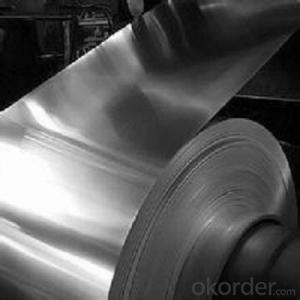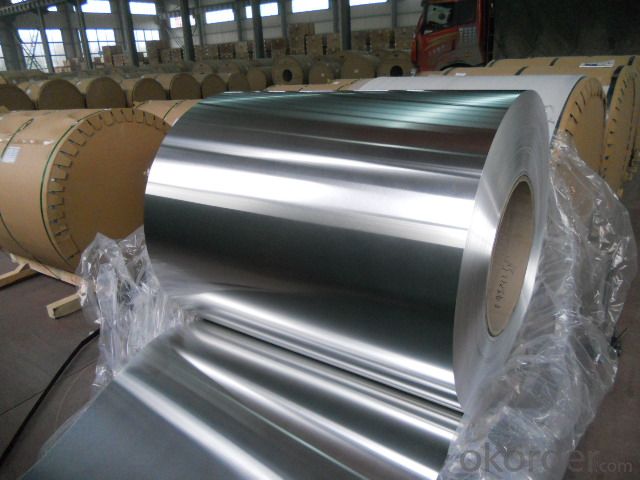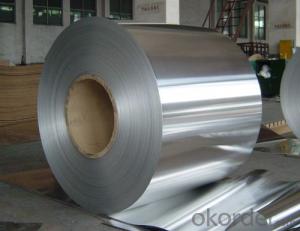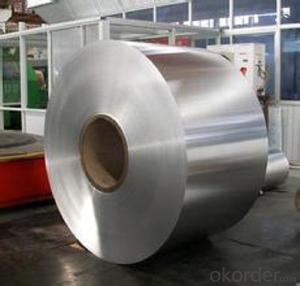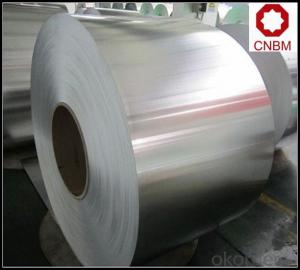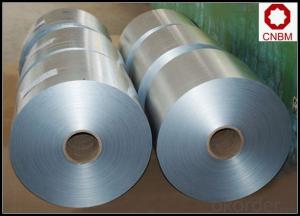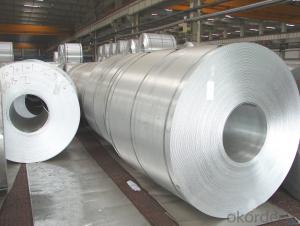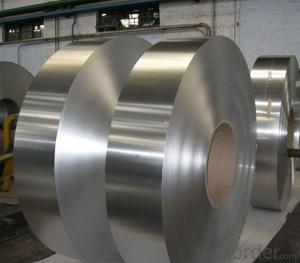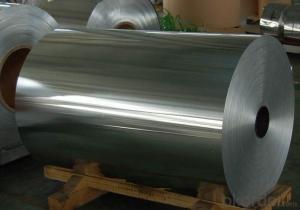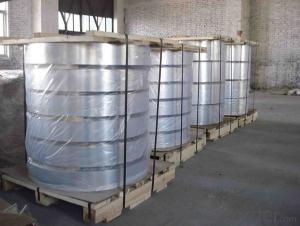5086 Aluminum Coil - DC and CC 1/3/5/6/8 Series Mill Finish Aluminium Coil
- Loading Port:
- Shanghai
- Payment Terms:
- TT OR LC
- Min Order Qty:
- 2.5
- Supply Capability:
- 5000 m.t./month
OKorder Service Pledge
OKorder Financial Service
You Might Also Like
Specification
DC and CC 1/3/5/6/8series Mill Finish Aluminium coil
l Product Introduction
Aluminium Coil is widely used in manufacturing aluminum thin sheet and aluminum foil. It is suitable for further machining with original standard quality. It is easy to be controlled and be manufactured to according to requirements.
l Product Specification
1.Aluminium coil application: building, celling, roofing, refrigerator, etc.
2.DC (hot rolling) and CC (continue cast) production lines, good perpority, no wave, no scratch
3.General alloy temper and specification see below table:
Product | Alloy | Temper | Size (mm) | Remark | ||
Thickness | Width | I.D. (mm) | ||||
Aluminum Coil | 1070 1060 1050 1145 1235 1035 1100 1200 3A21 3003 3004 3105 3103 8011 5052 5005 5754 6061 6063
| H18 H16 H26 H14 H24 O | 0.2-7.0 | 660-2200 | 150-600 | Edge without sheared |
l Packaging & Delivery
Packaging detail: Standard seaworthy exporting carton, Wooden pallets, waterproof paper and plastic coverage or as customer's requirements
Delivery detail: about 25 days from received oiginal L/C or advanced payment
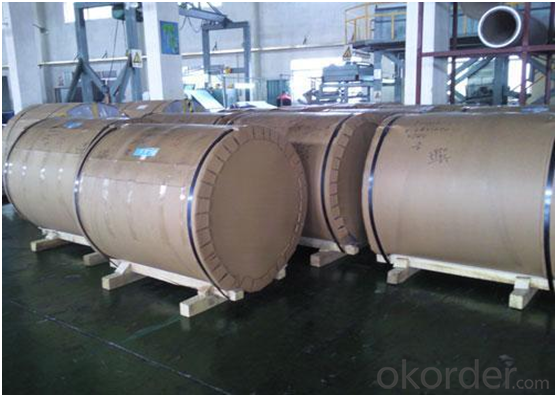
l Company Profile
CNBM International Corporation, China National Building Materials (Group) Corporation, is one of the largest companies in China building material & equipment industry, with 42,800 employees and sales in 2005 of US Dollar 4.395 billion. In 2006, China National Building Material Company Limited was listed on Hong Kong Stock Market with the stock code as 3323.
Aluminium coil is one of the popular product in the market of CNBM. With advanced technology and equipment, CNBM has sold its hight quality color coated aluminium coil to the world.
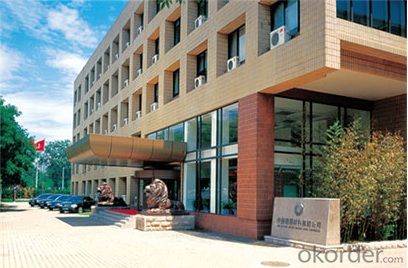
l CNBM World Wide
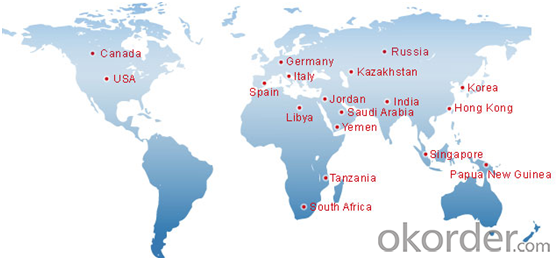
l Product Images
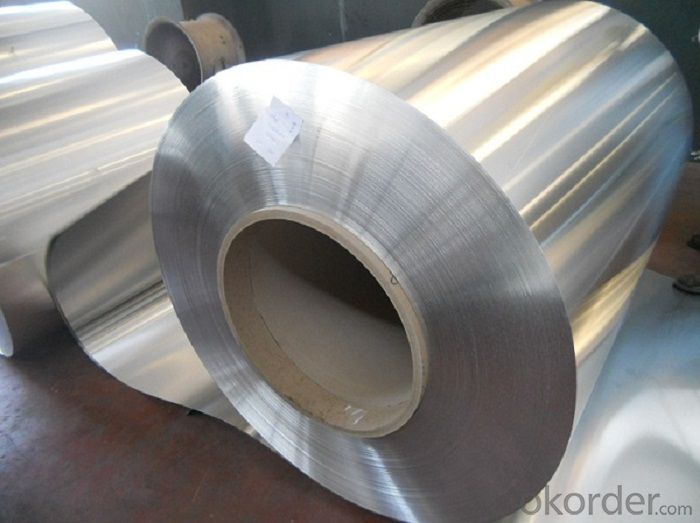
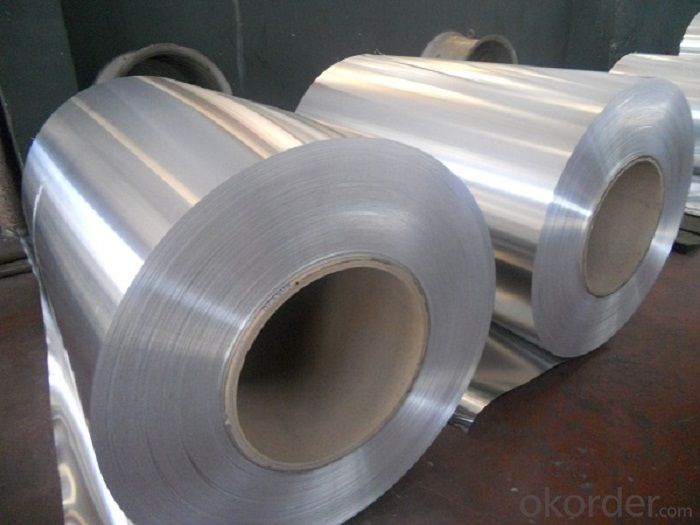
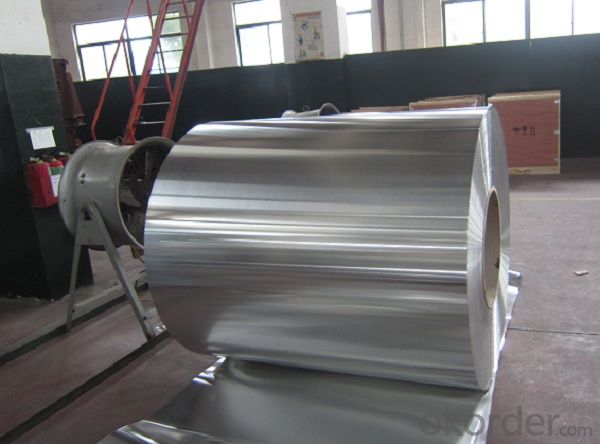
l Certificates
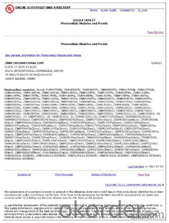
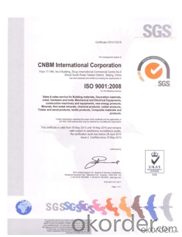
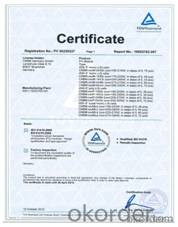
l FAQ
Q: Do you provide free samples?
A: Yes, free samples will be sent to you on freight at destination.
Q: Can I get your latest products catalogue?
A: Yes, it will be sent to you in no time.
Q: What is the MOQ?
A: 2.5 tons
Q: What are your payment terms?
A: We accept L/C, T/T.
- Q: Are aluminum coils suitable for curtain wall systems?
- Curtain wall systems can greatly benefit from the use of aluminum coils. This lightweight and durable material offers a multitude of advantages. Firstly, aluminum coils possess excellent corrosion resistance, ensuring the long-lasting and sturdy nature of the curtain wall system. This makes them particularly well-suited for exterior applications, where exposure to various weather conditions is inevitable. Moreover, aluminum does not rust, setting it apart from materials like steel. In addition, aluminum coils can be easily extruded into a wide range of shapes and sizes, allowing for flexibility and creativity in the design of curtain walls. This grants architects and designers the opportunity to create visually appealing and distinctive structures. Another notable feature of aluminum is its high sustainability. It is completely recyclable, meaning that it can be reused without any loss in quality. This makes aluminum coils an environmentally friendly choice for curtain wall systems, aligning with the growing demand for sustainable building materials. Furthermore, aluminum possesses excellent thermal and electrical conductivity, which can contribute to energy efficiency in curtain wall systems. By incorporating thermal breaks and insulation, aluminum curtain walls can effectively regulate temperature and reduce energy consumption, resulting in long-term cost savings. In conclusion, aluminum coils are an outstanding option for curtain wall systems due to their resistance to corrosion, versatility, sustainability, and energy efficiency.
- Q: This question asks about potential safety hazards when using electric heaters that have aluminum coils.
- <p>While electric heaters with aluminum coils are generally safe when used properly, there are some safety concerns to consider. Aluminum can heat up quickly and may become very hot, posing a risk of burns if touched. Additionally, aluminum coils can corrode over time, potentially leading to electrical shorts or fires. It's important to ensure that the heater is not covered or obstructed, as this can cause overheating. Always follow the manufacturer's instructions for use and safety precautions. Regularly inspect the heater for any signs of damage or wear, and never use a heater with a damaged cord or plug.</p>
- Q: Can aluminum coils be used for signage purposes?
- Yes, aluminum coils can be used for signage purposes. Aluminum is a versatile and lightweight material that is commonly used in the signage industry. It has excellent corrosion resistance, making it suitable for both indoor and outdoor applications. Aluminum coils can be easily cut and formed into various shapes and sizes, allowing for customizable signage designs. Additionally, aluminum is highly durable and can withstand harsh weather conditions, making it a long-lasting option for signage. The coils can be painted or coated with different finishes to achieve the desired aesthetic appeal, while also providing protection against fading and scratching. Overall, aluminum coils are a popular choice for signage purposes due to their versatility, durability, and aesthetic appeal.
- Q: What are the different coil slitting methods for aluminum coils?
- There are various coil slitting methods employed for aluminum coils, each with its own advantages and suitability for different applications. Some of the common coil slitting methods for aluminum coils include: 1. Rotary Shear Slitting: This method involves the use of a rotating knife or shear blade to cut the aluminum coil into narrow strips. Rotary shear slitting is suitable for high-speed production lines and offers excellent accuracy and clean edges. 2. Looping Slit: In this method, the aluminum coil is looped and fed through a set of rotating circular blades. The blades cut the coil into desired widths, ensuring precise cuts. Looping slit is commonly used for thin aluminum coils and offers good accuracy and productivity. 3. Double Knife Slitting: Also known as duplex slitting, this method involves the use of two circular knives positioned on top and bottom of the aluminum coil. The knives move in opposite directions, cutting the coil into multiple strips simultaneously. Double knife slitting is suitable for high-volume production and provides excellent accuracy and efficiency. 4. Razor Slitting: This method utilizes razor-sharp blades mounted on a rotating shaft to cut the aluminum coil. Razor slitting is particularly suitable for thinner gauge coils and provides clean, burr-free edges. 5. Crush Slitting: Crush slitting involves compressing the aluminum coil between two rotating rolls with sharp edges. The pressure exerted by the rolls cuts the coil into desired widths. Crush slitting is commonly used for thicker gauge coils and offers good productivity and edge quality. 6. Laser Slitting: Laser slitting employs a high-powered laser beam to cut the aluminum coil. This method offers exceptional precision and accuracy, making it ideal for intricate and complex cutting requirements. The choice of coil slitting method depends on various factors such as coil thickness, desired strip widths, production volume, and edge quality requirements. Each method has its own advantages and limitations, so it is essential to evaluate these factors to select the most appropriate coil slitting method for a specific application.
- Q: Can aluminum coils be welded or soldered?
- Yes, aluminum coils can be welded or soldered. Welding and soldering are two common methods used to join aluminum coils together. Welding involves melting the aluminum material in the coils and fusing them together using heat and pressure. This process requires specialized equipment and skilled operators. On the other hand, soldering is a process that uses a lower melting point filler material, called solder, to join the aluminum coils. Soldering is typically used for lighter applications and requires less heat than welding. Both welding and soldering can effectively join aluminum coils, but the choice between the two methods depends on the specific requirements of the project, the equipment available, and the expertise of the operator.
- Q: What specific cleaning procedures should be followed for aluminum coils post-usage to ensure their longevity and functionality?
- <p>After using aluminum coils, it's important to clean them properly to maintain their performance and longevity. Typically, a mild detergent and warm water solution can be used to gently clean the coils. Avoid abrasive materials or harsh chemicals that could scratch the surface. Rinse thoroughly to remove all detergent residues. For stubborn residues, a soft cloth or sponge can be used. It's also crucial to dry the coils completely to prevent corrosion. Regular inspection and maintenance, including cleaning, will help extend the life of aluminum coils.</p>
- Q: What are the different coil winding options available for aluminum coils?
- Aluminum coils offer several coil winding options to choose from. These options include: 1. Single-layer winding: This basic winding option involves winding the wire around the coil in a single layer. It is ideal for applications with limited space and the need for efficient cooling. 2. Double-layer winding: This option involves winding two layers of wire on top of each other. It provides improved heat dissipation and allows for higher power handling. 3. Concentric winding: With concentric winding, the wire is wound in concentric circles, each with a slightly different diameter. This type of winding reduces the overall size of the coil while maintaining high inductance. 4. Litz wire winding: Litz wire is composed of individually insulated strands. This winding option minimizes skin effect and reduces power loss due to high-frequency currents. It is commonly used in high-frequency applications. 5. Toroidal winding: Toroidal winding creates a circular shape for the wire, forming a toroidal coil. This type of winding offers better containment of the magnetic field and reduces electromagnetic interference. 6. Layered winding: Layered winding involves winding the wire in multiple insulated layers. It is used when a compact space requires a high number of turns. 7. Sectional winding: Sectional winding divides the coil into different sections and winds each section separately. This allows for better control over magnetic flux distribution and reduces losses. Each coil winding option has its own advantages and is suitable for different applications based on factors such as power handling capacity, size constraints, and frequency requirements.
- Q: Can aluminum coils be used for automotive applications?
- Yes, aluminum coils can be used for automotive applications. Aluminum is a lightweight and durable material that offers several advantages in the automotive industry. It is corrosion-resistant, which is beneficial for vehicles that are exposed to various weather conditions. Additionally, aluminum coils have good thermal conductivity, allowing them to efficiently dissipate heat, which is crucial for automotive applications such as radiators and heat exchangers. Aluminum coils are also easy to form and shape, making them suitable for manufacturing various automotive components. Overall, the use of aluminum coils in automotive applications can contribute to weight reduction, improved fuel efficiency, and enhanced performance.
- Q: What are the typical dimensions for aluminum coils?
- <p>The standard size of aluminum coils can vary depending on the specific application and industry requirements. Commonly, aluminum coils are available in widths ranging from 600mm to 2000mm and thicknesses from 0.2mm to 6.0mm. The length of the coils can be from 500 meters to over 3000 meters, depending on the weight and the manufacturing process. It's important to note that these dimensions are not fixed and can be customized to meet specific project needs.</p>
- Q: Is it safe to use aluminum coil for food storage?
- <p>Using aluminum coil for storing food is not recommended. Aluminum can react with acidic or alkaline foods, potentially leaching aluminum into the food. This can be harmful to health, especially over time. Instead, opt for food-safe materials like glass, stainless steel, or BPA-free plastics for food storage to ensure safety and prevent contamination.</p>
Send your message to us
5086 Aluminum Coil - DC and CC 1/3/5/6/8 Series Mill Finish Aluminium Coil
- Loading Port:
- Shanghai
- Payment Terms:
- TT OR LC
- Min Order Qty:
- 2.5
- Supply Capability:
- 5000 m.t./month
OKorder Service Pledge
OKorder Financial Service
Similar products
Hot products
Hot Searches
Related keywords
